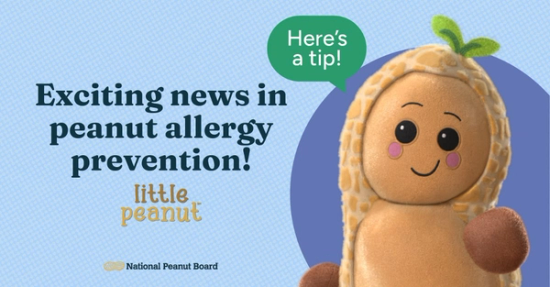Markita Lewis, MS, RD
New research offers the strongest real-world evidence yet that early introduction of peanut foods is making a significant public health impact.
A study from Children’s Hospital of Philadelphia (CHOP), published in Pediatrics on October 20, 2025, found that peanut allergy rates in children under age 3 have dropped by 43% since the American Academy of Pediatrics (AAP) first recommended early peanut introduction in 2015. Researchers also observed an overall 36% decline in all food allergies, driven largely by decreases in peanut allergy diagnoses.
The findings were based on electronic health record data from more than 120,000 children across both academic and private pediatric practices nationwide. The study compared children born before and after the introduction of early feeding guidelines and found that these recommendations are having measurable, population-level effects.
These results are a milestone moment—offering support that the guidance inspired by earlier landmark research, like the LEAP study, is successfully translating into real-world prevention. Future research will focus on families’ at-home feeding practices to further refine timing, frequency, and amounts for optimal protection.
Helping Providers Put Research into Practice
In addition to confirming that early introduction works, another Pediatrics study this month demonstrated how to help clinicians successfully implement these guidelines.
The Intervention to Reduce Early Peanut Allergy in Children (iREACH) Trial showed that when pediatricians are equipped with education, digital tools, and visual aids, they are far more likely to recommend early introduction to parents. In the study, 84% of clinicians who received these supports followed the guidelines for low-risk infants—compared to just 35% in the control group.
The practice-based trial, which included more than 18,000 infants across 30 pediatric practices, highlights that awareness and practical tools are key to changing provider behavior and supporting families in taking early, preventive action.
Resources for Providers and Parents
The National Peanut Board (NPB) is proud to support efforts that empower providers and caregivers with the tools they need to promote early peanut introduction. You can explore studies, clinical resources, and parent-friendly materials at PreventPeanutAllergies.org.
Healthcare professionals who see infants can also request a Little Peanut plushie—a one-of-a-kind educational tool designed to make early introduction approachable and fun for families—at LittlePeanut.tips.
Together, we’re helping to ensure every child has the opportunity to grow up free from peanut allergy—and to enjoy America’s favorite nut.
References
- Du Toit G, Roberts G, Sayre PH, et al. Randomized trial of peanut consumption in infants at risk for peanut allergy. N Engl J Med. 2015;372(9):803-813. doi:10.1056/NEJMoa1414850
- Fleischer DM, Sicherer S, Greenhawt M, et al. Consensus communication on early peanut introduction and the prevention of peanut allergy in high-risk infants. J Allergy Clin Immunol. 2015;136(2):258-261. doi:10.1016/j.jaci.2015.06.001
- Togias A, Cooper SF, Acebal ML, et al. Addendum guidelines for the prevention of peanut allergy in the United States: Report of the National Institute of Allergy and Infectious Diseases-sponsored expert panel. J Allergy Clin Immunol. 2017;139(1):29-44. doi:10.1016/j.jaci.2016.10.010
- Stanislaw J. Gabryszewski, Jesse Dudley, Jennifer A. Faerber, Robert W. Grundmeier, Alexander G. Fiks, Jonathan M. Spergel, David A. Hill; Guidelines for Early Food Introduction and Patterns of Food Allergy. Pediatrics 2025; e2024070516. 10.1542/peds.2024-070516
- Ruchi S. Gupta, Lucy A. Bilaver, Jialing Jiang, Richard D. Cohn, Michael S. Carroll, Marc Rosenman, Waheeda Samady, Adolfo J. Ariza, Helen J. Binns, Amy L. Christison, Joy Laurienzo Panza, Alkis Togias; Pediatric Clinician Adherence to Peanut Allergy Prevention Guidelines: A Randomized Trial. Pediatrics 2025; e2025071233. 10.1542/peds.2025-071233
